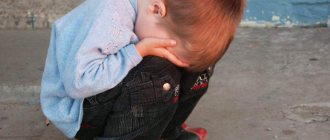Today, the “law on spanking,” as Article 116 and its part 1 were called, has been removed from the area of criminal liability.
Physical punishment in the family can be considered an administrative offense if it causes moral and physical suffering to minors, but does not lead to health problems.
But the line between harsh disciplinary measures and beating is so thin that in Russia anyone can come to the defense of a minor who is being beaten; bruises and abrasions received from those closest to them should force the services that protect childhood to act.
Just one “educational” blow can cause serious health problems. Increasingly, the media are talking about cases where, in the course of “upbringing,” parents who cannot control themselves maim or even kill their children.
Beating a child by his parents
Often, in response to allegations of harsh treatment of children, parents motivate their actions by the accepted method of education . And they refer to traditions accepted in the family, according to which disciplinary measures against the offender may imply physical punishment.
They consider torn hair, bruises and hematomas to be the norm. However, the law, which has become quite friendly to spanking on the street or at home, is still strict in relation to parents who regularly beat their children.
For beating a minor that causes physical pain but does not result in health problems, parents may face a fine or even restriction of freedom and mandatory community service. The fact of family relations is not significant here.
Battery is a blow inflicted intentionally that causes physical pain.
To prove the fact of beatings, a forensic expert can record:
- bruises (usually on soft tissues);
- bruises and bruises;
- superficial abrasions, wounds, hematomas.
In addition, other signs of violent acts may be considered evidence.
These may be marks from compression of limbs and other parts of the body, pinches, bite marks, torn hair. Important: violent actions against children also include tying up, restricting freedom in a cramped enclosed space, prolonged kneeling, especially on peas (there are also those who use such a barbaric method of punishment among supporters of “traditional methods of education”).
Differences between physical abuse and torture
Education using physical force cannot be considered beating. Disciplinary measures that involve striking for certain offenses are considered acceptable by some. Moreover, among the supporters of such methods there are even teachers and law enforcement officers.
It is believed that a child should clearly understand why this kind of punishment awaits him, and not live in constant fear that he will be hit, or even beaten.
The effectiveness of this method of education is highly questionable. If the law protects the physical integrity of citizens, then on what basis can it be violated in relation to the youngest Russians?
The usefulness of this method, which only convinces the child that the one who is stronger is right, also raises doubts. Paradox: a slap, a slap on the head, or a blow from a boss for a job done incorrectly will be perceived by any subordinate as, at best, an insult. But the same subordinate will consider it normal to hit his son for unfinished homework or a bad grade.
Supporters of physical punishment, no matter what family values they refer to, are simply unable to use other methods of education, and are not smart and educated enough to establish a relationship with a child without causing him pain .
The consequences of even one blow can be very disastrous.
- The child withdraws into himself and does everything to prevent his parents from finding out about his misdeeds.
- There is growing distrust in the world, the family, and the state, which is unable to protect.
- The pain inflicted on a child in a family, in a home where he considered himself safe, makes him realize his own defenselessness against brute force and begin to either learn to respond to aggression with aggression, or to lie, dodge, hide information for which he can be punished, in any way. including illegal methods.
Don’t hit, advises Dr. Komarovsky
He himself admitted that at least once, his children received a “soft spot.” Sometimes this is the only quick way to stop a little person from taking the wrong step. The main thing here is not to cause pain, but rather to stun the child, to protect him from, for example, throwing himself onto the road or hitting his mother.
To parents’ requests to help them, to teach them how to stop beating their children for disobedience, Komarovsky answers briefly: “Don’t touch them with your finger. Under no circumstances. Only in emergency cases, but it won’t hurt.”
So, put yourself in the place of a little person, look at the world through his eyes.
If you don’t succeed right away, try again and again until you can completely refuse physical punishment. 2 thousand 5.0 Rate this article Published: 01/13/2021
What is the penalty for beating children?
Many parents believe that the choice of educational measures is entirely their business. Whether or not they beat children should not be anyone's business. However, when it comes to cruelty, the law stands up to protect the interests of the child.
Moreover, punishment is different from punishment. If the mental state suffers, if the child ends up in a hospital bed, the unfortunate “educator” will also face punishment.
What laws govern it?
Attention! Based on Articles 115 and 116 of the Criminal Code, for beating causing bodily injury (minor) a parent can go to prison for up to 2 years. Systematically applied measures of such “influence” on the basis of Article 117 of the Criminal Code of the Russian Federation can lead to imprisonment for up to 7 years.
Article 116. Beatings
Beatings or other violent actions that caused physical pain, but did not entail the consequences specified in Article 115 of this Code, committed out of hooligan motives, as well as for reasons of political, ideological, racial, national or religious hatred or enmity, or for reasons of hatred or enmity in in relation to any social group, is punishable by compulsory labor for a term of up to three hundred sixty hours, or correctional labor for a term of up to one year, or restriction of freedom for a term of up to two years, or forced labor for a term of up to two years, or arrest for a term of up to six months, or imprisonment for up to two years.
A person who causes harm to a young child under 14 years of age or a minor can spend 5 years behind bars (Article 112 of the Criminal Code of the Russian Federation). If the victim’s health is seriously damaged, the culprit can spend up to 10 years behind bars .
And the fact that the child was punished or beaten by his legal representative, who was obliged to take care of him, only aggravates the guilt.
How much does the severity of the beating influence the degree of responsibility?
Moms and dads can get away with a spanking or even a few in front of witnesses.
However, if the fact is recorded again, there are witnesses to this, the child himself complains that he is being beaten, the parents face administrative punishment (fine up to 30,000 rubles, imprisonment for up to 30 days, compulsory labor) .
If the beatings caused health problems, we are talking about a criminal offense for which the parents will be held accountable, like any other criminal.
We have already written in more detail about the punishment for beating a minor child.
Reasons and motives
Among the reasons why parents physically punish a child or minor are often cited family traditions of upbringing , the inability to cope with other methods of influence, and the uncontrollability of a son or daughter.
However, most often the root of the problem is the incompetence of mothers and fathers, inability to educate or unwillingness to fulfill the responsibilities of raising children. Often they take it out on children for failures at work and in their personal lives, considering them to be the culprits of all troubles.
Most often, beatings are inflicted on children under 5 years of age: the child is obviously helpless, he does not yet understand where and how to turn for help, or who to tell about the fact that he is being beaten.
Sometimes such children do not even know how to speak, or they have been told that it is shameful and forbidden to talk about such things with strangers , or minors are intimidated and are afraid of more serious punishment if they let slip about where they got the bruises.
As a rule, already at school, where children are in front of many strangers - peers, teachers, psychologists, it becomes impossible to hide the truth. Kids are already able to correctly assess the mood of their parents and the level of threat, run away, hide, and call for help.
Bruises and abrasions will certainly attract attention, and the student himself is able to talk frankly with the teacher. That is why the very facts of beatings of school-age children become known more often, but offenses and crimes against them occur less often in families.
Is it necessary to adopt parental experience?
Are there any statistics on what grown children who were previously beaten do to their children?
V.G .: In 90% of cases, a beaten child will do the same, because he does not know any other way. But there are also those who, having matured, understand that they do not want to act in such a cruel way with their baby.
Yu.K .: Parents often say: “I was beaten as a child, and nothing happened: I grew up to be a normal person!” But this is a big trap, because it is obvious that the parenting methods that were used 25-30 years ago are absolutely not suitable for modern children. The world, society, and the children themselves are different now. The volume of the psyche of modern children is many times greater than 30 years ago.
Right to defense
Like every citizen of our country, a child has the right to protection. His interests can be represented by children’s rights ombudsmen, social educators, teachers, employees of guardianship authorities, departments for minors’ affairs and the protection of their rights,
No parent should think that the little man they born is completely theirs and they can do whatever they want with it.
Both the victim himself and neighbors and school employees can report an offense and demand the intervention of law enforcement agencies in a situation that threatens life and health.
They say about this:
- Constitution of the Russian Federation.
- Convention on the Rights of the Child.
- Education Act.
- Family code.
Attention! Many lawyers undertake to defend the interests of children for free, realizing the harm that can be caused to a defenseless creature.
Moral violence
Sometimes children answer the question: “Do your parents beat you?” They answer: “It would be better if they beat me.” What can you do to a child to make him respond like that? Alas, sometimes moral violence is more dangerous for a child than physical violence. The guilty child is insulted in every possible way, forced to ask for forgiveness from his parents for a long time and humiliatingly, to write some explanations and oaths on a piece of paper. Someone doesn’t talk to a child because of a trifle, until the unfortunate child begs: “I’m sorry!” Some parents make you bow at their feet and kiss their hand. Someone strips me naked and makes me stand like that in the middle of the room, with my hands at my sides. In general, people’s imagination works, it’s pure creativity. In any case, physical impact is always moral violence, and moral bullying can cause harm to the physical and mental health of a child. Is it possible to do without punishment at all in the educational process? I think no. The main thing here is not to turn punishment into violence against the child’s personality. Let's talk about this in the next article.
How to prove and defend?
To bring charges, evidence will be required; one statement will not be enough.
Who can report?
Neighbors, relatives, and close people who become aware that a child is being beaten should not ignore this fact. Caregivers and teachers who notice signs of violence on a child’s body can also report beatings.
Where to contact?
If beatings are discovered, you should contact the police, the inspectorate or department for minors, guardianship authorities, the Ombudsman for Children's Rights, or the court.
It is enough to contact one authority so that a full investigation is carried out , both family members and immediate circle are interviewed. A statement is not always necessary; sometimes an anonymous call is enough.
Evidence
Even if the beatings did not leave marks on the body, torn clothes and damaged items can serve as material evidence of beatings and beatings of a child .
The lack of necessary clothing, food, household and hygiene supplies, toys, items for development and training can indicate improper performance of duties.
You can have the beatings removed at the forensic bureau , and if you had to go to a hospital for help, a doctor must issue a certificate of bodily injury.
Are witnesses needed?
If there are witnesses to a violation of the law, their testimony should definitely be recorded for the court. As a rule, those who saw a child being beaten, both children and adults, do not give up their testimony. After all, everyone understands that otherwise there will simply be no one to protect the baby.
Is it possible to prove without witnesses?
The marks left on the body will in themselves be evidence of ill-treatment. In addition, psychological testing, medical diagnostics, and the child’s own story will help confirm the fact of harm to the child.
What to do if the police don't help?
Unfortunately, police officers often choose to remain inactive until a more serious crime is committed.
If the application is refused to be accepted or nothing is done about it, you should contact the guardianship authorities , social workers at the school or education department, the ombudsman for children's rights or the guardianship authorities. It is effective to appeal to representatives of the public and the deputy corps.
Features and nuances
Any case of domestic violence is unique; it is impossible to judge the situation as a whole based on one fact that has become known. Some nuances also become important. For example, this is beating a minor of his peer.
Beaten by father
The child takes punishment from the father for granted, but what is worse is that the mother, the other person in her family, considers violence to be the norm and does not consider it necessary or is simply afraid to report the beatings. In this case, the testimony of witnesses and teachers, whose responsibilities also include protecting the child, is valuable.
Babysitter beating
It is not always possible to immediately notice the fact of beating, or even systematic beating of a child by a nanny. The baby will be afraid to say where he got the bruises; the nanny herself may intimidate him, saying that the parents will punish him in the same way for what he did.
Important! Parents are obliged to be vigilant, pay close attention to the appearance of wounds and bruises on the child’s body, and thoroughly find out where they came from. Rough treatment of a small child is simply unacceptable.
Take care of your mental balance
You are tired during the day. I would like to say: “leave me alone, let me rest.” Better do the following.
While you cook dinner or wash the dishes, play calm games with your baby, such as words. Or give him a piece of paper, pencils, and let him draw his mother, sitting next to him at the kitchen table.
Did you turn on the TV and lie down on the sofa? Draw with your baby. Play with dolls, construction sets, cars. Little is needed from you - just help, you can lie down. 20-30 minutes of quiet activities, and a satisfied child will go about his business, and you will have a little rest.
Come up with little joys for yourself. Understand what you enjoy. Maybe it's a big teddy bear to hug, or a walk in the park in the rain. Museum, dancing, fishing, flowers - make your list and treat yourself from time to time.
This will make everyone feel good, but the question of how to restrain yourself so as not to hit the child will leave you. Calm parents mean calm children.









